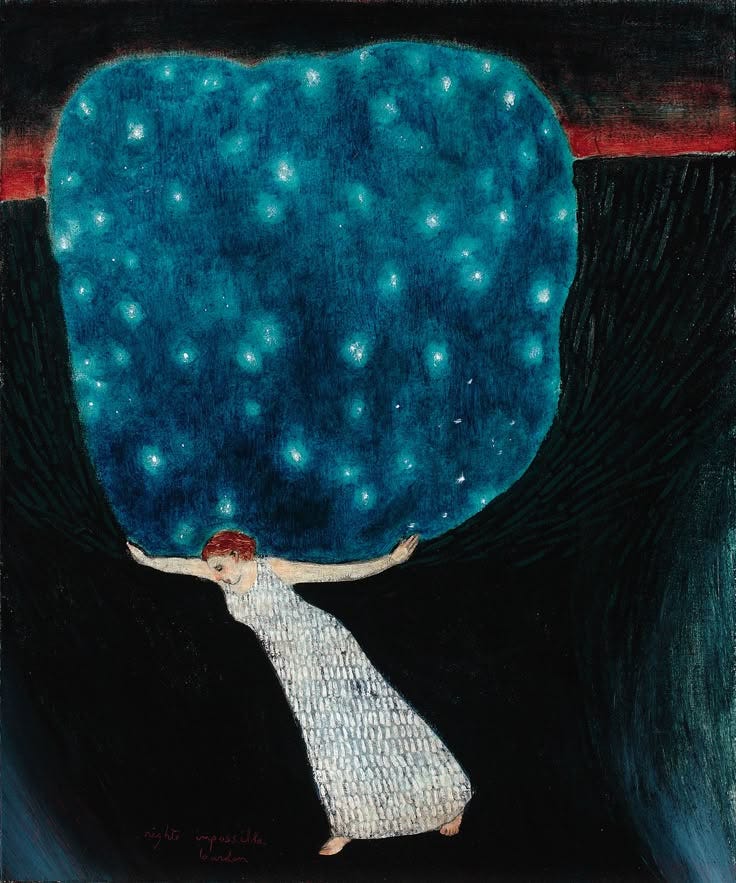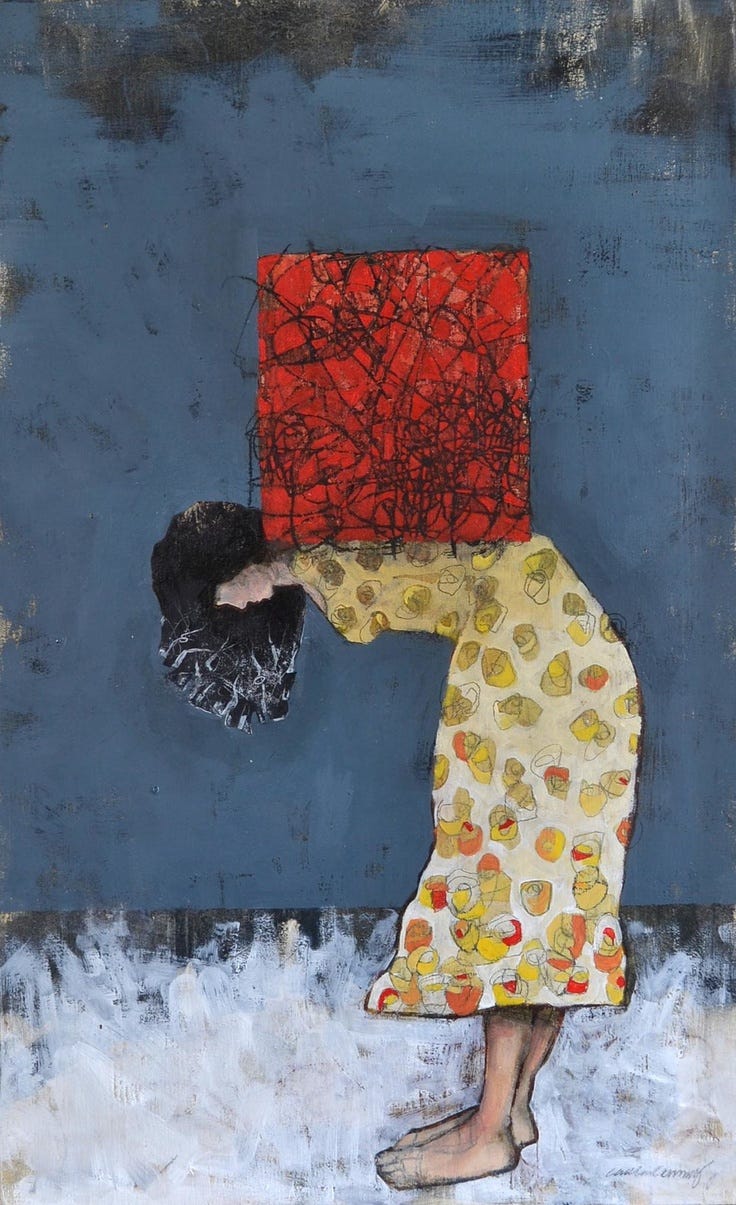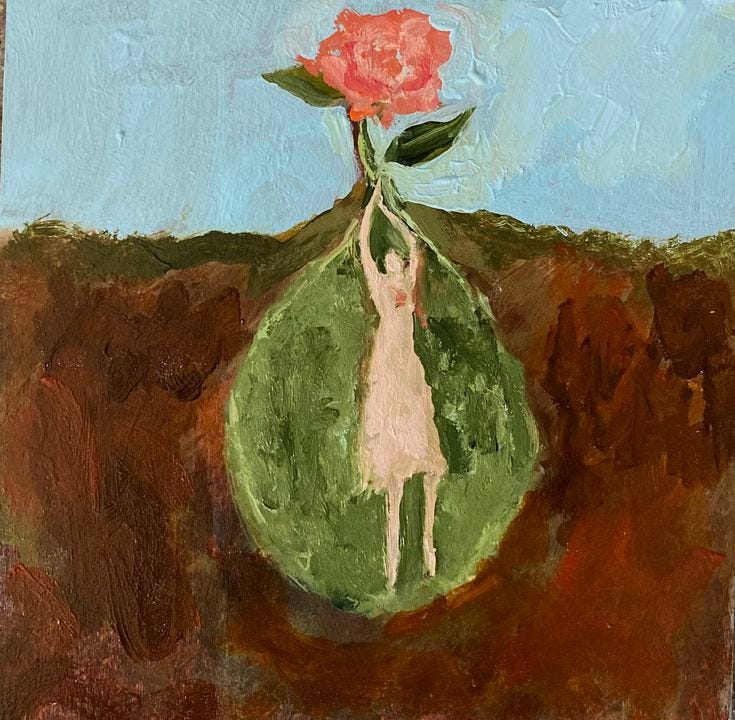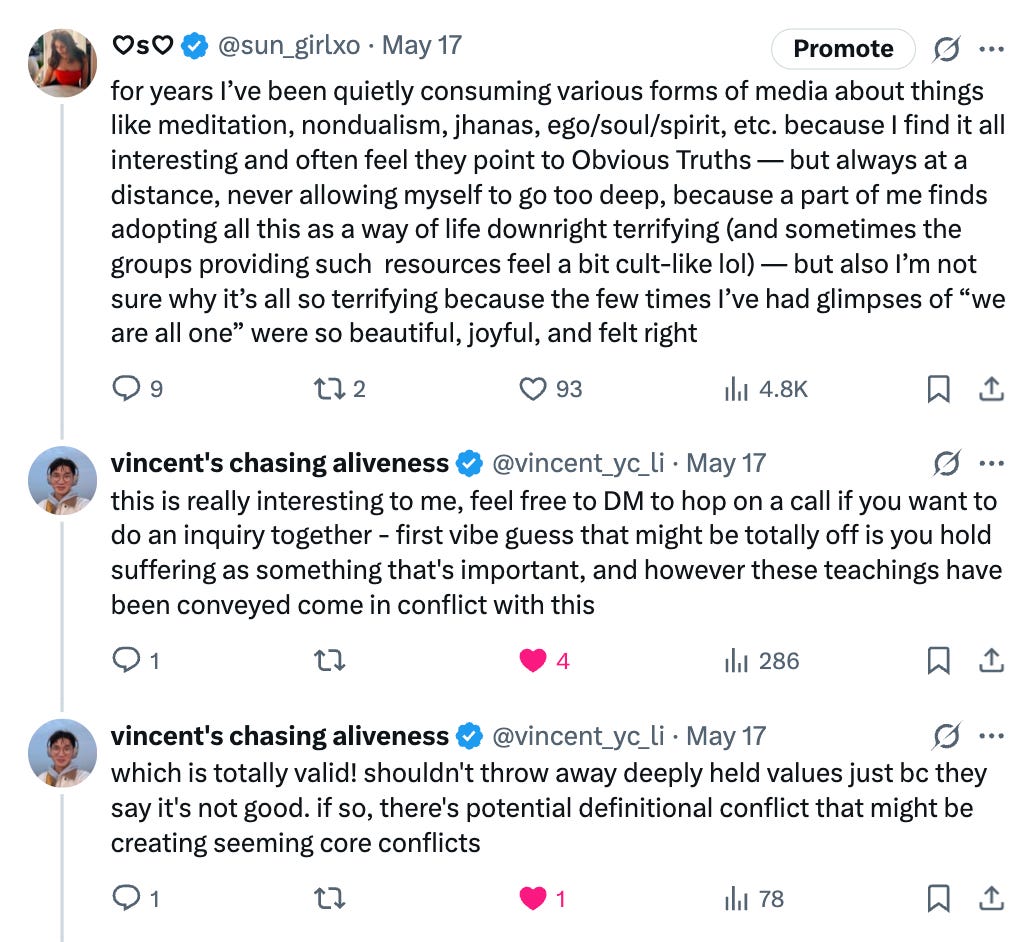redefining my relationship with suffering
on being fundamentally okay, and how identity conceals our core self
But here we are in great danger—the danger of being jealous of the blues of others, or of blues of times past. For while one may repeatedly insist that all one wants is to be satisfied and happy, the truth is that one can often find oneself clinging to samsara with a vengeance.
— Maggie Nelson, Bluets
A couple of years ago, I started writing an essay about how I don’t want to live in a world devoid of suffering because life would then cease to have meaning, and we would cease to be human. I truly believed this, and I would even find myself in hours-long debates with loved ones who dreamed of a world where suffering was significantly reduced, if not outright eliminated.
“If I could snap my fingers now and end all suffering in the world, I would,” they would say. I would get angry and respond with something like: “All suffering? Even heartbreak? Even experiences that lead to growth, deepen our wisdom, and inspire beautiful art?” The debates never felt constructive; no one was ever satisfied in the end.
It’s clear to me now that these were not simply debates about some hypothetical world with some specific amount of suffering. We were defending, as if our lives depended on it, our relationships with suffering. Every single one of us, whether or not we have explicitly thought about what suffering means to us, has a deep and complex personal relationship with it. This means conversations about suffering will often be unproductive: they will appear logic-driven on the surface, but in reality, definitions will vary, emotions will rule, and few will leave with changed minds.1
Ultimately, I decided not to publish my essay because the woo-woo parts of me believed its publication would somehow bring suffering into my life and force me to eat my words.2 Suffering is important, I thought, but that doesn’t mean I’ll always welcome it. Well, suffering came shortly thereafter anyway. For the first time, I was forced to confront my relationship with suffering. What is it? How did it form? Is it serving my current needs? Do I want to keep it, or am I ready for something new?
In my essay, I was careful to differentiate between what I considered meaningful suffering, such as that in the moral realm, and meaningless suffering, including illnesses and tragic deaths. My argument was essentially this: moral suffering lends depth and meaning to our lives in a way that happiness alone cannot. Experiences that are inherent to the human condition (e.g., regret, heartbreak, guilt, loss) often result in suffering that helps one develop wisdom, which is necessary for human flourishing. They are experiences that gift us with opportunities to learn and grow, and without them, what meaning are we left with in this life?
Physical suffering, I thought, we could do away with entirely without losing any meaning in life. Houellebecq captured my thoughts on both physical and moral suffering quite well in his essay rejecting physician-assisted suicide:3
No one wants to suffer. Suffer physically, that is. Moral suffering has its charms, it can even generate aesthetic material (as I have discovered for myself). Physical suffering is pure hell, devoid of interest and meaning, from which no lessons can be drawn. Life has been sketchily (and falsely) described as a quest for pleasure; it is, more accurately, an avoidance of suffering; and more or less everyone, given a choice between unbearable suffering and death, chooses death.
— Michel Houellebecq, How France Lost Her Dignity
I was also careful to note to readers that I was not some masochist romanticizing suffering, nor was I holding on to this belief as a way to cope with any suffering I’ve experienced. (In fact, I consider myself a very happy person, I wrote in my post.)
But what does it mean for someone to be attached to her suffering? Would she know if she was attached?
When we’re defending our relationship with suffering—whether that means being vehemently against it or protecting it like it’s our child—we sort of are defending it as though our lives depend on it. Not for literal survival but for the survival of one’s sense of self, because one’s relationship with suffering shapes a core part of one’s identity. In this sense, for better or worse, our relationship with suffering is protective; it serves a very important need.
Defining the Self is tricky, and my understanding of it has been evolving for years. Last year, in my post knowing yourself, I wrote:
At the start of this post, I noted my belief that I present my “authentic self” to people. But what if I’m thinking about the self all wrong? An authentic self implies the existence of an inauthentic self and, thus, some sort of fracturing of the self. What if there is only Self, rather than the dualities we agonize over: higher vs. lower, instinctual vs. intellectual, controller vs. controlled, good vs. bad, current vs. desired?
After further reading and deep self-inquiry, I’ve come to believe a couple of foundational things about the Self:
(1) We are all fundamentally okay; our core Self is already whole and undamaged. I got this from one of my beloved mentors: we are like Russian dolls—all of us have layers shaped by our adopted identities, defenses, experiences, and learned behaviors, but at our core is a solid and unchanging version of ourselves, concealed but never damaged by the outer layers. This is our Self—our essence—where our fundamental okayness lies. Healing, it turns out, is natural to us; our bodies instinctively know how to do it. So when we do self-work to heal, we’re not becoming okay or fixing ourselves—we’re peeling layers to discover that we are already okay, undamaged, and everything we hope to be.
Put differently, and very beautifully, by Vincent, a longtime mutual: “yin is about unclenching and unresisting all the way so that you find out that you are always already fundamentally loved. there is nothing you need to do to be loved. things are fundamentally ok, and there is no spiritual problem to solve.”4 I felt this and knew it to be true once during a guided meditation about this exact idea. The Russian doll metaphor helps me tremendously when I doubt myself; it allows me to tap into the insight I gained during my meditation.
In Women Who Run with the Wolves, Clarissa Pinkola Estés tells us the story of La Loba to drive this point home. In mythology, La Loba is an old woman who lives in the wild, collecting bones and singing them back to life. Symbolically, bones represent the indestructible force that lives within us—our soul-spirit and deep instinct—which La Loba guards and revives in times of crisis. “We know the soul-spirit can be injured, even maimed, but it is very nearly impossible to kill,” says Estés. “You can dent the soul and bend it. You can hurt it and scar it. You can leave the marks of illness upon it, and scorch marks of fear. But it does not die, for it is protected by La Loba in the underworld. She is both the finder and incubator of the underworld.” The lesson here applies to the real world just as much as it does to the mythological one. Estés—poet, author, psychoanalyst, and post-trauma specialist—is reminding us that no matter how hard things get, how endless rock bottom seems, there is a force within us that is always there and ready to protect us, if we let it. (Hence the importance of self-work.5)
Mary Oliver’s poem The Journey perfectly describes the painful experience of shedding layers—e.g., people’s bad advice or demands, nonsense on the internet that makes its way into our beliefs, poor self-esteem shaped by a bad relationship, etc.—to find one’s unadulterated Self, “a new voice which you slowly [recognize] as your own”:
With enough time and exposure, or under the right circumstances, the voices of others—the bad advice, the demands that are incongruent with our wishes, the insults, threats, fearmongering—form new layers of identities that conceal one’s core Self, one’s own voice.
Your art isn’t good enough. —> My art isn’t good enough.
A man isn’t worthy unless he can provide. —> I’m not worthy unless I can provide.
Stop wasting your time on silly interests and focus on something that will lead to a meaningful career. —> I love doing this, but I need to stop wasting my time on these silly interests so I can focus on something that will lead to a meaningful career.
A relationship is unhealthy if it doesn’t lead to an engagement within two years. —> My relationship is not healthy if he doesn’t propose within two years.
We’ve all seen these takes on social media—often meticulously crafted in the form of think pieces or video essays, or supported by endless anecdotes—or been told various versions of these statements by family members who think they are being helpful. The younger we are, the more susceptible we are to forming identities around these voices. If a parent tells us to stop wasting time on frivolous hobbies and instead focus on finding a real job, a few things might happen:
If we love that parent, yearn for their approval, or even just rely on them for food and shelter, their voice eventually seeps into our mind and becomes our own. It’s not just that someone is telling me to stop wasting my time; I need to stop wasting my time.
A new identity layer is formed, perhaps something like “I am not an [insert frivolous hobby: artist, writer, designer, musician]” or “I’m a serious person who cares about my career.” This identity is important in the sense that it ties back to the fact that we love that parent, or want their approval, or need them for food and shelter. In other words, we create this identity to help us secure love or safety.
Most likely, under this new identity, we give up or deprioritize the “frivolous” hobby. And most likely, doing this causes some degree of suffering because it was never fully our own decision; it served other people’s needs first, then intertwined our own needs with theirs, and now it’s too hard to untangle everything and decipher what’s really going on.
Since the new identity serves a core need (love or safety or connection or belonging), and the suffering becomes enmeshed with the new identity, the suffering gains importance, too. Giving up this suffering might mean giving up this identity, which could risk love, safety, connection, or belonging.
This requires some seriously complex mental gymnastics to uphold, creating more tension and suffering—but this is, ultimately, how much of identity works anyway.6
(2) By its nature, identity fractures our sense of self and conceals the whole Self that exists at our core. Identity, or your sense of self, is who you know yourself to be at any given moment. It’s created by a thought that tends to be so deceptively simple that it’s often overlooked, but the implications are quite significant: identity shapes one’s reality and is the root cause of one’s behaviors even in areas of life that are seemingly unrelated to that identity.
When someone forms an identity, which usually happens unknowingly, it creates a layer that conceals the core, or the whole Self. This fractures our sense of self, forcing us to seek wholeness. But—and here’s the cruel paradox of identity—this search for wholeness is happening in service to the very identity that fractured us in the first place, which only reinforces that identity.
Wholeness, then, is impossible to achieve within the framework of our identity. The issue is that our identity is so all-encompassing that it can be exceptionally difficult to nail down and interrogate, so we often go through lengthy periods not knowing why we’re behaving the way we’re behaving, why we continue to suffer when our supposed goal is to minimize suffering, why we can’t seem to break out of our cycles.
This idea is from the book I Am: A Guide to Transforming Reality and Creating the Life You Want by Anya Lincoln. (It’s not exactly the kind of book I’m typically drawn to because it comes off a little too self-help and woo-woo, but I’m always open to exploring different perspectives on identity and consciousness, given my longstanding obsession with these topics. I’m glad I gave the book a chance.)
Here’s an example from I Am of how identity fractures our sense of self (emphasis mine):
In the Identity paradox, both the problem and the solution have to coexist simultaneously as a part of the same reality—one cannot exist without the other.
For example, a person who experiences life as a constant struggle may try to fix their circumstances so they don’t have to struggle anymore. They can work on their strategies and ways of negotiating within their world and making better decisions. But if their identity can only be defined in terms of struggle and overcoming it, both the struggle and its opposite—the state of no struggle (even if only a hopeful possibility)—will have to be present to give the Identity the context it needs to be real. No matter what the person does, the push and pull of the old reality will continue. They will never be able to create a sustainably loving and enjoyable reality without giving up the “I am” that created the conflict in order to exist. To permanently solve the issue of both brokenness and the reality that supports it, in other words, to return to oneness, a creator must give up their Identity.
Someone who was hurt as a child might later assume the identity of a victim, seeing himself as vulnerable to forces beyond his control. To feel whole, he might develop a drive to defeat anything that resembles the original threat; his identity creates a condition in which he must overcome such threats to validate his sense of self. The risk here is that, for this identity to survive, the person will need to be in situations that provide enough threat for him to fight and defend himself. If he gives up his identity as a victim, it will feel as though he’s giving up his motivation to fight and defend himself. Both need each other to exist: the victimhood identity (problem) and the need to overcome threats (solution).
Giving up an identity feels like a suicide mission, but according to Lincoln, that’s because it is, “but only for the thought that creates the mess and struggle in the first place.” Importantly, the goal here is not to replace one’s problematic identity with a positive one: “The point of Identity work is to free a person, not to redefine them.”
The search for wholeness pervades our culture. Everywhere, people feel broken and search for something—a relationship, food, shopping, status, money, beauty—to fill voids within themselves. From psychoanalyst Neville Symington:
The personality is not a unitary phenomenon. We are all made up of parts, each part is capable of functioning as a separate little person. The basic psychological problem for human beings is to get all these parts to act together harmoniously. When we talk of someone having emotional problems, as opposed to practical problems, we mean that they are having trouble “getting it together”—becoming one. We aspire to be whole, but it is always a struggle because we are battling against something.
This may just be the human condition. Individually, we begin as one with nature, in utero, before being violently separated by birth; we begin thinking we are one with our mothers before discovering that we are separate through the natural psychological process of individuation. Collectively, humanity began as one with nature before consciousness and intelligence made us aware of our mortality and separated us from it. Symbolically, therefore, we always begin as one with God before separating and being forced to grapple with the consequences—both liberating and oppressive. In each circumstance, separation creates a void, forcing us to search for wholeness. To psychoanalyst Erich Fromm, love in all its forms is the only answer to this problem of human existence—brotherly love, motherly and fatherly love, erotic love, self-love, and love of God. From his book The Art of Loving: “The awareness of human separation, without reunion by love—is the source of shame. It is at the same time the source of guilt and anxiety.”
We create identities to help us cope with the unbearable anxiety of separating from a state of Oneness—whether that state exists for us through love, nature, God, the universe, the divine, grace, or whatever else. Since identities fracture our sense of self, concealing the whole Self at our core, we suffer. At the same time, we are accustomed to a way of being as a result of our identity; it becomes hard to fathom not just another way of life but another reality entirely. So suffering—in various ways and to various degrees—and our sense of self go hand in hand.
So, back to defending suffering as though our lives depend on it. Our identities, which inform our lives and convince us that they are the only way we’ll gain love and safety and approval, depend on it. And while the identities themselves are not explicitly about suffering, they shape our relationship with suffering.
Suffering, I now understand, is not the same as pain. Pain is inevitable—we will all deal with experiences like relationships ending, health scares, job rejections, interpersonal conflicts, etc. Our reaction to these events—rumination, revenge plotting, mismanaged rage, “why me?” questions, etc.—is what determines whether we will suffer. Maybe I was wrong, and it’s not necessarily suffering that ultimately leads to wisdom, growth, and flourishing. It can, but it can also create more suffering, hate, and ugliness in this world.
It continues to astonish me that we regularly know what we need to do to minimize our suffering, and yet it’s never that simple. I think a big reason behind this is the complex relationship between (a) the identities we think we need to secure love and (b) the suffering those identities require us to endure.
I recently posted that I’ve had and enjoyed many glimpses of Oneness from certain meditations, but frustratingly find myself resistant to going deeper into such teachings. Vincent sensed it right away: I hold suffering as something important for various reasons. Clearly, this didn’t just lead to hours-long debates with friends about hypothetical worlds in which suffering doesn’t exist, it got in the way of various pursuits that would truly fulfill me. This was plain as day, and I couldn’t see it!
Part of redefining my relationship with suffering now is understanding that suffering is not something I need to cling to or completely abandon. Rather, it’s a signal I can learn from: what deeper belief or value is my suffering protecting? Does it still need protection? Am I ready to untangle this knot to be freer, more at peace?
In hindsight, I should have known this was happening, as I’ve written about this exact phenomenon using Alasdair MacIntyre’s theory about the breakdown of the modern moral landscape in his book After Virtue: A Study in Moral Theory.
Wait, the person arguing for the importance of suffering doesn’t want to suffer? Ha!
I have very complicated feelings about physician-assisted suicide. I often swing between “of course I support this” and “my god, what are we doing?”
I highly encourage reading the full tweet for an important piece of context, which is that being fundamentally okay does not mean you shouldn’t “do anything” or “improve yourself”. Self-work is important, skills development is important, growth is important; these are all part of the yang domain, which works in synergy with the yin domain (you are already whole and loved and okay as you are).
As far as I understand, Sasha Chapin describes all of this as “Deep Okayness” or “persistent self-love” in his fantastic post about psychological transformation, which I highly recommend reading. (Before venturing into my own self-work, his post did not make sense to me. Now, I’m intimately familiar with the experience he talks about.)
I wrote about the complexity around identity formation in my post i am me before i am anything else, which references Erich Fromm’s fantastic book Escape from Freedom.





![r/Poetry - [POEM] The Journey - Mary Oliver r/Poetry - [POEM] The Journey - Mary Oliver](https://substackcdn.com/image/fetch/$s_!I8Aa!,w_1456,c_limit,f_auto,q_auto:good,fl_progressive:steep/https%3A%2F%2Fsubstack-post-media.s3.amazonaws.com%2Fpublic%2Fimages%2Fc2e3bf7a-6846-42ad-bdc8-d5f384e08d98_640x853.jpeg)


❤️🩹
There's a gag in Death of the Reprobate where you come across two dudes in the forest arguing over whose wounds are worse and you have the option of telling them that suffering is relative, which is probably meant to be pretty tongue-in-cheek but is low key at least a little profound.
I think "that which doesn't kill you makes you stronger" is only true in the sense that it can be valuable to learn from mistakes, but the closer it comes to literal the more obvious it seems that this is very much not true. Being physically maimed can incur continued hardship and may leave your health palpably worse off; being psychologically maimed, at least in my limited experience, never leaves one better off. There's a frequent need for suffering to -have meaning-, and I think that's very okay inasmuch as it motivates one to be more in tune with their inner turmoil, but I worry that it tends to go awry when we start to lionize suffering, to need others to have suffered as a character building exercise when it's prejudicial of the degree to which suffering is relative. Similarly, we can wisely see the unwise-ness of wishing away all suffering--in its absence we would rapidly find new things to find intolerable--and so we can keenly recognize it for the empty-calories-of-moral-philosophy that it is.
Excellent work, your writing frequently pulls out some interesting thoughts. I wrote a longer reaction to the one a few posts back too: https://scpantera.substack.com/p/on-masculinity